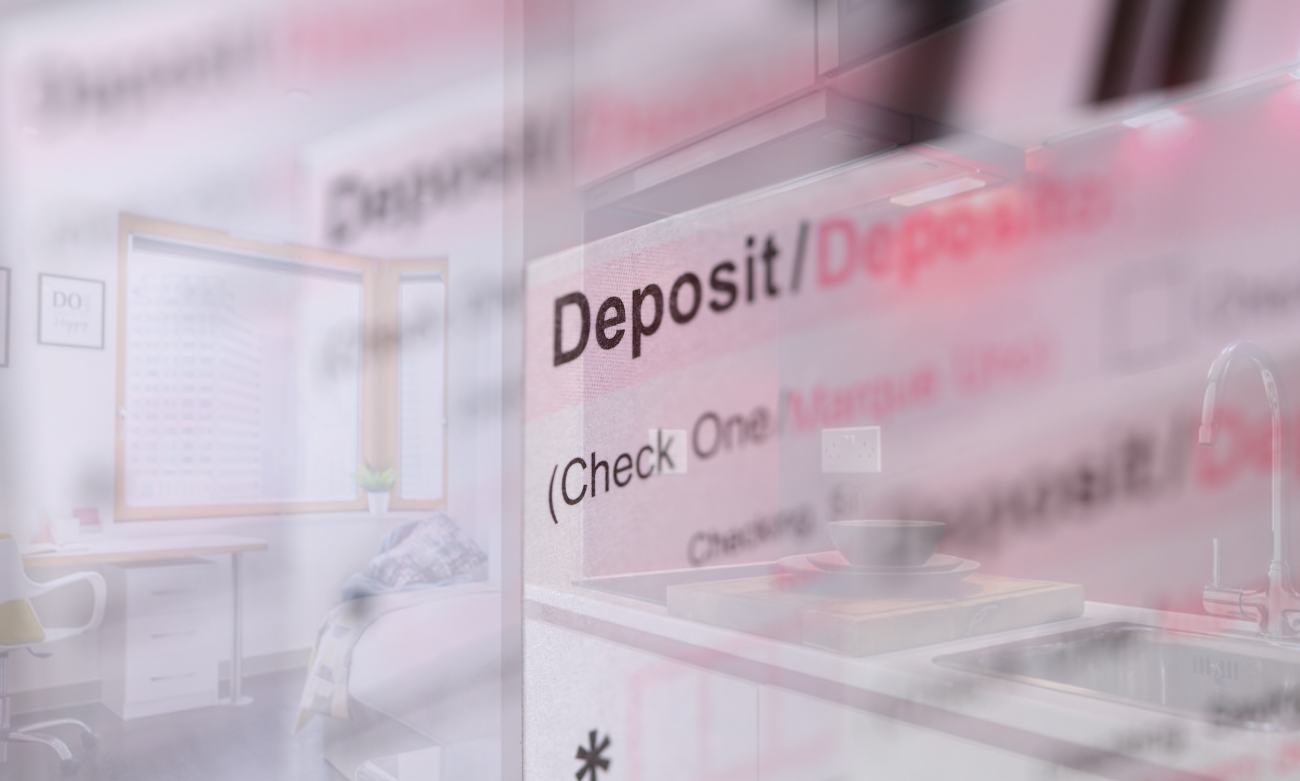How to get your rental deposit back

How to get your rental deposit back
When you sign a rental contract whether it is for a room within student halls, purpose-built student accommodation or with a private landlord to rent a flat or house you will pay a deposit. This deposit is returnable when you move out of the property. But what happens when your landlord refuses to give you back the deposit.
In this blog we explore whether this is legal; under what circumstances your landlord can keep all or part of your deposit; what you can do to get your deposit back and much more.
How much deposit can a landlord request?
The law states that the maximum deposit a landlord can request is equal to 5 weeks’ rent. So, to work this out do the following calculation:
• Monthly rent x 12 = Total
• Take yearly rent ÷ 52 to get the weekly rent.
• Take the weekly rent x 5 To get the maximum amount of deposit.
This limit applies to all assured shorthold tenants (AST) when the yearly rent is less than £50,000 and this applies to students in halls, purpose-built student accommodation and those renting from a private landlord.
Who keeps the deposit?
In the UK all accommodation providers, including universities, must keep the deposit with a third-party, government approved, company.
The landlord must pay your deposit into a Tenancy Deposit Scheme (TDS) within 30 days of receiving it and needs to give you a receipt and details of which TDS they are using. That way if there is a dispute you can contact the TDS and ask for help as they are duty bound to act as a mediator between you and your landlord.
The deposit is kept in the TDS until you move out and if the rent payments have been made and the property has not been damaged the deposit is returned to you, typically in 10 working days, after you vacate the property.
If there is a dispute, both parties must present their case, along with evidence, to the TDS. After the case has been assessed the TDS will decide on whether to return a percentage, the whole amount or none of the deposit.
How to check whether your landlord is keeping your deposit according to UK legislation.
Once you have paid your deposit, get a receipt from your landlord and make a note of which deposit scheme they are using. Ideally this should be written into your rental contract.
Your landlord has 30 days in which to deposit the money you have paid into one of the three tenancy deposit protection schemes that are protected by law which are named below. Depending on which scheme your landlord has used you can go online and check your deposit has been registered properly.
Each of these schemes has a platform to check if your deposit has been protected.
1. Deposit Protection Service
2. My Deposits
3. Tenancy Deposit Scheme
If you cannot find your deposit in one of these schemes, it is likely it has not been protected. And you should get in touch with your landlord in writing right away.
Under what circumstances can a landlord refuse to pay back a deposit?
The deposit you pay safeguards the landlord in the event you do not pay your rent, or you cause damage to the property. It also covers the cost of a deep clean or the removal of rubbish after you leave.
The landlord needs to inform you in writing that they intend to keep all or part or your deposit and the reason. And you should be given the opportunity to refute the claim, by contacting the landlord and the tenancy deposit scheme in writing.
Equally the deductions made should be reasonable and good landlords highlight costs of things like a deep clean or removing rubbish in the rental contract.
What to do if your landlord refuses to return your deposit?
If your deposit has been protected by a tenancy deposit scheme, which is a legal requirement for all landlords, you can get in touch with the scheme that the landlord is signed up to for assistance.
You will need to provide them with the details of the dispute in writing and they will contact the landlord on your behalf and be the intermediary to resolve the matter.
What happens if my landlord doesn’t protect my deposit?
Firstly, it is a legal requirement for your landlord to deposit the money you pay as your deposit into one of the three government approved schemes.
Ensure this is noted in the rental contract and you have a receipt of the deposit you have paid including the amount, the date you paid it. You should also get confirmation when the money will be put into the tenancy deposit scheme, and you can check this has been done by going onto the website of the scheme.
If your landlord does not pay in the money within 30 days contact your landlord in writing to request the money is paid into the scheme within 14 days. If the landlord fails to do this you are entitled to claim compensation, which is typically three times the amount of the original deposit.
When will the deposit be returned?
At the end of your tenancy, if all is well with the property and there is no damage or rent to pay, your landlord should give you back your deposit in full. If, however, you owe rent, you have damaged the property, or you have lost or broken some items from the inventory, your landlord may be entitled to take money from your deposit.
The deposit should be paid into your nominated bank account within 10 days unless you agree a different timescale with your landlord.






